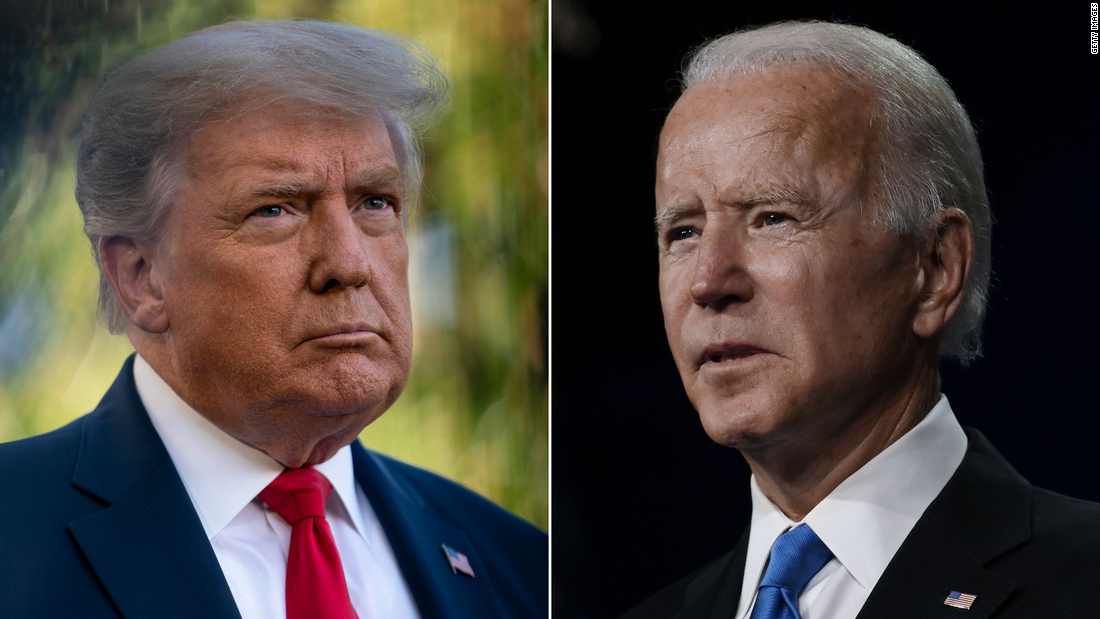
(CNN)We're less than three years away from the 2024 presidential election. That hasn't stopped polls of a potential matchup between President Joe Biden and former President Donald Trump -- which indicate Biden is in trouble -- from being published.
For those tempted to look at these polls or the current political environment to try to glean something about the next general presidential election, I have only one thing to say: Stop it. Neither the current presidential polling nor the current political environment tells us much about what will happen in the 2024 general election.
Let's start with the horserace polling (i.e. the matchup between two candidates). There have been seven previous election cycles prior to this one where polling was taken between an incumbent and their eventual challenger at about this point in the cycle.
When you match up the polling and the ultimate margin, the relationship is statistically insignificant.
The average difference has been 8 points between the polling margin and actual election margin. Back in 2017, Biden had a more than 11-point advantage at this point. He ended up beating Trump in the popular vote by nearly 4.5 points -- a nearly 7-point difference with the early polling.
Keep in mind, though, the average difference between the polling and outcome in a small historical sample can greatly underestimate the potential differences in the future. Taking into account the differences that have happened in the past along with the sample size (seven elections), the 95% confidence interval for how well polling predicts the outcome is close to +/- 30 points.
Indeed, Harry Truman had a 28-point advantage over Thomas Dewey in late 1945 polling. He would win in 1948, but only by 4.5 points.
Any way you look at it, the horserace polling doesn't tell us much of anything about how things will shake out in 2024.
One big reason the polling at this point is unpredictive of the outcome is that we really don't have any idea what the political environment will be on Election Day 2024.
The best way to measure the political environment, especially if Biden ends up being his party's nominee, is a president's approval rating.
Biden is struggling now with an approval rating well below his disapproval rating. His negative net approval rating (approval - disapproval) nationally is a big reason why Democrats lost the Virginia gubernatorial election and why they trail on the generic congressional ballot ahead of 2022.
But when you look at a president's net approval rating at this point and compare it to where it ends up in the next presidential election, there just isn't any connection.
For the 10 presidents since World War II who would go on to seek another term, there was a 29-point average difference between their net approval rating at this point and by the time of the election.
While the general trend has been for presidents to be less popular in the next presidential election than they were at this point, this isn't always the case. Trump was more popular on Election Day 2020 than he was at this point in 2017. Bill Clinton became more popular, too, and he easily won a second term.
Given that two of the last four presidents (Clinton and Trump) had net approval ratings gains of about 10 points or more between this point and when they faced reelection, it would be silly to bet against Biden doing the same.
You'll notice, too, that Clinton and Trump saw their parties get shellacked in the midterms.
This gets at something to keep in mind over the next year: The results in the 2022 elections don't really tell us anything about 2024. Historically, there is zero correlation between midterm results and the next presidential results or a president's approval rating in the next presidential election.
There are plenty of presidents (such as Jimmy Carter in 1980 and George H.W. Bush in 1992) who lost reelection even though their parties did better than the historical average in the previous midterms. There are plenty of presidents (such as Clinton in 1996 and Barack Obama in 2012) who won reelection even though their parties did worse than the historical average in the midterms.
On the other hand, there are presidents whose party had minimal losses in the midterms (e.g. Richard Nixon in 1970) and easily won re-election.
The bottom line: The polling right now tells us about the current political environment heading into the midterms. But the data we're examining at this point and even a year from now doesn't tell us much of anything about what comes after that.
"Stop" - Google News
November 28, 2021 at 11:09PM
https://ift.tt/3pq5ZQD
Why we need to stop with the 2024 predictions - CNN
"Stop" - Google News
https://ift.tt/2KQiYae
https://ift.tt/2WhNuz0
Bagikan Berita Ini














0 Response to "Why we need to stop with the 2024 predictions - CNN"
Post a Comment